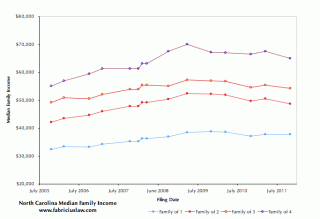New Means Testing Incomes: NC Family Median Incomes Lowest Since 2008
The United States Trustee this month released the updated means testing figures to be used in bankruptcy cases filed on or after 11/1/2011. In North Carolina, the median income levels for households of 2, 3, and 4 people has declined from 3/15/2011 values. This is the third year in a row where these November median income values are lower than the March figure, and median household incomes for 2, 3, and 4 member households have not been at a lower amount since early 2008 in North Carolina.
The previous and new median income figures are as follows:
| Household Size | Income (cases 3/15 to 10/31/2011) | Income (cases on or after 11/1/2011) |
| 1 Person | $37,781 | $37,892 |
| 2 People | $50,630 | $48,710 |
| 3 People | $55,468 | $54,310 |
| 4 People | $67,578 | $65,036 |
| Additional Persons | $7,500 each | $7,500 each |
The weak median income figures are associated with the continued weak economic environment state-wide. For potential bankruptcy debtors with gross household incomes (as calculated under the bankruptcy means test) between the old and new median income figures, prompt consultation with a bankruptcy attorney will allow an informed decision on timing the bankruptcy petition. Classification as an above median income debtor can impact eligibility under chapter 7 as well as chapter 13 payment amount and plan length. In certain cases, classification as an above median income debtor may be advantageous to chapter 13 debtors when formulating a chapter 13 plan.
- Log in to post comments




